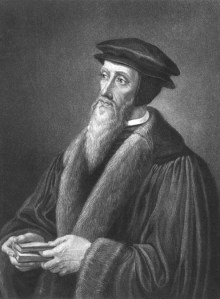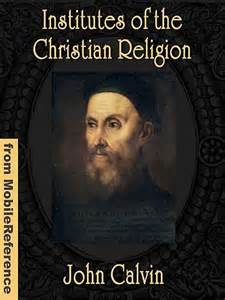Dislaimer: The following is a paper submitted by Pastor Brian Chilton to Liberty University. This paper has been scanned and admitted through “Safe Assign” and will be detected by any and all accredited universities and colleges if a person attempts to use the following paper as their own. No part of this paper may be copied and pasted into another paper without giving credit to the author. Failure to do so may, and most likely will, result in charges of plagiarism by the student’s respected school. Charges of plagiarism can result in academic probation and/or expulsion.
Thesis Statement
The purpose of this paper will be to evaluate the beliefs of John Calvin concerning election.

Introduction
Calvinism is one of the most controversial theological systems that have entered Christendom. Do modern individuals truly understand Calvin’s beliefs on election? This paper will seek to evaluate the essence of John Calvin’s beliefs pertaining to election. In order to accomplish this evaluation, the paper will first define election from a theological standpoint. Then, the paper will provide an evaluation of Calvin’s view of God in relation to election. The paper will then provide an evaluation of Calvin’s views of humanity as it pertains to election. Finally, the paper will provide an evaluation of Calvin’s understanding of human free will.
Defining Election and John Calvin
In this portion of the paper, the man behind Calvinism will be examined. Also, the definition of election will be presented and shown how it relates to the viewpoints of John Calvin. John Calvin is best known for his viewpoints concerning election. In fact, election is Calvin’s imprint upon theology. Calvin was in fact the “systematizer of the Reformation…”[1] Galli and Olsen state that “To this day, Calvin’s name is associated, for good and for ill, with the city of Geneva. And Calvin’s belief in God’s election is his theological legacy to the church.”[2] For this reason, it is important that one understands the man behind the doctrine as one undertakes a study on Calvin’s view of election.
John Calvin was born in “Noyon, Picardie. His father was a notary who served the bishop of Noyon, and as a result Calvin, still while a child, received a canonry in the cathedral that would pay for his education.”[3] Therefore, Calvin benefited from an active involvement in ecclesiastical and academic life from an early age. Eventually Calvin would run into problems with French royalty due to his involvement in the Protestant movement. At this time, “The Anabaptist takeover of Münster…made Francis I regard anyone interested in reform of the church as potentially seditious.”[4] Although Calvin was known as a pastor and reformer, Calvin is perhaps best known for his writings. The Institutes of the Christian Religion, which will be referenced in this paper concerning Calvin’s theology, became a manual for those who adhered to the Reformed branch of Protestantism. Calvin, in fact, had two reasons for writing this manual. Steinmetz indicates that the Institutes were “…designed not only to ‘transmit certain rudiments by which those who are touched with any zeal for religion might be shaped to true godliness’ but also to explain the theological views of Protestants to the French king…”[5] Therefore, one must wonder how much of Calvin’s Institutes were influenced by his desire to promote what would be seen as a peaceful version of Protestantism…if at all.
When one speaks of the issue of election, that which has already been identified as Calvin’s imprint upon theology, it is a multi-faceted affair. Election involves one’s views of God, humanity, and human free-will. However, a simple definition of election would be rendered in six statements as given by Klooster:
1. Election is a sovereign, eternal decree of God…2. The presupposition of God’s eternal decree of election is that the human race is fallen; election involves God’s rescue plan…3. Election is ‘election in Christ’…4. Election involves both the elect’s salvation and the means to that end…5. Election (as well as reprobation) is individual, personal, specific, particular…6. Finally, the ultimate goal of election is the glory and praise of God.[6]
All orthodox Christians[7] hold to some version of election. However, Calvin and his followers would view election differently than those who were not of the Reformed tradition. Election involves how one views God, humanity, and a person’s ability, or lack of ability, to respond to the grace of God. In the next section, the paper will address Calvin’s view of God in relation to his view of election.
Evaluation of Calvin’s View of God Concerning Election
In this portion of the paper, Calvin’s viewpoints concerning God as it relates to his theology of election will be presented. How does Calvin view God? John Calvin has an incredibly high view of God. In fact, Calvin believes that God is so great that it may be impossible for humanity to fathom the greatness of God. Calvin writes that,
Our wisdom, in so far as it ought to be deemed true and solid Wisdom, consists almost entirely of two parts: the knowledge of God and of ourselves. But as these are connected together by many ties, it is not easy to determine which of the two precedes and gives birth to the other. For, in the first place, no man can survey himself without forthwith turning his thoughts towards the God in whom he lives and moves; because it is perfectly obvious, that the endowments which we possess cannot possibly be from ourselves; nay, that our very being is nothing else than subsistence in God alone.[8]
Therefore, human knowledge of God is limited at best in the Calvinist theological theme. While Calvin would accept that humans can have natural knowledge about God, that knowledge would not equate to saving faith. For instance, Calvin does not deny that natural knowledge of God[9] is possible. Rather, saving faith cannot be known without special revelation and that revelation comes from God. Calvin writes,
For although no man will now, in the present ruin of the human race, perceive God to be either a father, or the author of salvation, or propitious in any respect, until Christ interpose to make our peace; still it is one thing to perceive that God our Maker supports us by his power, rules us by his providence, fosters us by his goodness, and visits us with all kinds of blessings, and another thing to embrace the grace of reconciliation offered to us in Christ. Since, then, the Lord first appears, as well in the creation of the world as in the general doctrine of Scripture, simply as a Creator, and afterwards as a Redeemer in Christ,—a twofold knowledge of him hence arises: of these the former is now to be considered, the latter will afterwards follow in its order.[10]
Therefore, Calvin would tend to believe that God is known by all individuals in a general sense as Creator, but the personal relationship offered to a human being is not known unless God reveals Himself as Redeemer.
Such a view is also apparent in Calvin’s commentary on Romans 1:20. Paul writes that “For since the creation of the world His invisible attributes, His eternal power and divine nature, have been clearly seen.”[11] Concerning this passage, Calvin states that Paul “does not mention all the particulars which may be thought to belong to God; but he states, that we can arrive at the knowledge of his eternal power and divinity; for he who is the framer of all things, must necessarily be without beginning and from himself.”[12] One can almost find hints of Thomas Aquinas in Calvin’s theology; for it was Aquinas that said that “it is necessary to admit a first efficient cause, to which everyone gives the name of God.”[13] God is eternal and beyond the scope of the universe. Therefore when it comes to all things including salvation, God is the first mover. God finds man and not vice versa. Helm writes that “Calvin makes it clear in the Institutes that he is committed to the view that God is simple (‘a simple, single essence’). But he not only adheres to a version of the idea of divine simplicity, he is an eternalist; that is, he holds that God exists beyond or outside time.”[14]Calvin’s theology is based upon a high view of God.
How much can humanity know about God outside the scope of special revelation? Surprisingly, Calvin believed that humans could know some of the attributes of God pertaining to God’s existence. Calvin wrote that “though experience testifies that a seed of religion is divinely sown in all, scarcely one in a hundred is found who cherishes it in his heart, and not one in whom it grows to maturity so far is it from yielding fruit in its season.”[15] For Calvin, an element of divine knowledge is known by all because of the necessity of God’s existence, but this did not indicate that Calvin believed that humanity could make a necessary response to God unless moved because God is the prime mover as will be noted in the next section.
Before moving on, one must note the great emphasis that Calvin places on God’s sovereignty. It is this emphasis that sets Calvinism apart from other theological systems. Norman Geisler describes the term sovereignty as “‘what a sovereign has,’ namely control over his kingdom. God’s sovereignty—the idea that God is in control of the whole universe…”[16] Perhaps no other passage of Scripture relays the sovereignty of God better than Romans chapter 9. It is perhaps in Calvin’s commentary that one catches the full glimpse of Calvin’s view of God. Calvin is not persuaded that the love of God is the moving force behind God’s salvation of humanity. Calvin writes that he did “consent not to the opinion of those who think that Paul spoke these words from regard to God only, and not to men; nor do I agree with others, who say, that without any thought of God, he was influenced only by love to men: but I connect the love of men with a zeal for God’s glory.”[17] Therefore for Calvin, God’s primary choice to save was based on God’s sovereign zeal for God’s own glory. Calvin would say that God has no obligation to save anyone since God relies upon no one or nothing. So, God’s choice of saving souls is entirely God’s sovereign choice. Calvin would make this clear as he wrote that
But that no one may imagine, that Pharaoh was moved from above by some kind of common and indiscriminate impulse, to rush headlong into that madness the special cause, or end, is mentioned; as though it had been said,—that God not only knew what Pharaoh would do, but also designedly ordained him for this purpose. It hence follows, that it is in vain to contend with him, as though he were bound to give a reason; for he of himself comes forth before us, and anticipates the objection, by declaring, that the reprobate, through whom he designs his name to be made known, proceed from the hidden fountain of his providence.[18]
In one sense, it would seem that Calvin viewed foreknowledge as part of God’s general knowledge. That foreknowledge, or prescience, was not a prerequisite for a person’s salvation as the decision to save originated with God. When one examines Calvin’s statements closely, one will find that all things were appointed by God; being that some humans were chosen by the sovereignty of God for heaven and others were chosen for damnation for the purpose of God’s glory. It is here that one must pause and contemplate whether Calvin does an injustice to the character of God. Arminius would certainly believe so.
Jacob Arminius held that Calvin’s interpretation of election was “repugnant to the nature of God, especially with regard to those attributes by which he performs and manages all things: his wisdom, justice, and goodness.”[19] Arminius would hold that, from God’s perspective, individuals are chosen by “which God decreed to save and to damn certain particular persons. This decree has its foundation in divine foreknowledge, through which God has known from all eternity those individuals who the established means of his prevenient grace would come to faith and believe.”[20] For Geisler, salvation is not an either/or situation but a both/and concerning election and foreknowledge. Geisler writes that “Election is not based on or dependent on foreknowledge. Rather, election is in accord with it.”[21] Geisler would not see foreknowledge as the prerequisite for salvation nor would he find foreknowledge of ill effect on the purpose of election. For this reason, Geisler would not belong completely in the Arminian camp and he would not completely belong in the Calvinist camp either.[22] While this writer would agree with Geisler’s interpretation, one should expect to find such difficulties when seeking to understand the infinite, sovereign God and God’s relationship with humanity. Nonetheless, it should be noted that Calvin’s main emphasis on God’s decision-making is less in tune with God’s loving nature but rather on God’s glory. The reverse is true for Arminius’ theology. How one view’s God’s nature impacts one’s views concerning the human capacity to respond to God’s grace. This will be the issue in the next section.
Evaluation of Calvin’s View of Humanity Concerning Election
In this portion of the paper, Calvin’s viewpoints concerning the nature and depravity of humanity will be given. Does a person have knowledge enough of God to respond to God’s grace? It must be noted that Arminius, contrary to popular belief, did not hold that one could consciously respond to the grace of God without first having one’s eyes opened to the gift of salvation by the grace of God. Arminius states that he “would go so far as to assert that the creature, although regenerated, can neither conceive, will, nor do any good at all, nor resist any temptation, apart from this preventing and awakening, this continuing and cooperative grace.”[23] The issue of the free will of humanity will be examined in the next section. However, the nature of human depravity is oddly shared by both Calvin and Arminius. The question is what is the extent of this depravity?
For Calvin, human depravity is complete and extends to every faculty. Calvin defines original sin as “a hereditary corruption and depravity of our nature, extending to all the parts of the soul, which first makes us obnoxious to the wrath of God, and then produces in us works which in Scripture are termed works of the flesh.”[24] Calvin would view humanity as completely depraved and totally incapable of responding in any way to the goodness of God. But what about the love of God regarding lost souls?
When considering the lost, one must remember that Calvin focuses on the glory of God over the love of God. The apostle Paul asked, “What if God, although willing to demonstrate His wrath and make His power known, endured with much patience vessels of wrath prepared for destruction?”[25] Calvin views this verse as follows,
If the Lord bears patiently for a time with these, not destroying them at the first moment, but deferring the judgment prepared for them, and this in order to set forth the decisions of his severity, that others may be terrified by so dreadful examples, and also to make known his power, to exhibit which he makes them in various ways to serve; and, further, that the amplitude of his mercy towards the elect may hence be more fully known and more brightly shine forth;—what is there worthy of being reprehended in this dispensation? [26]
Non-Calvinists and moderate Calvinists may view this verse differently. Geisler would view Romans 9:22 as indicating that the vessels of wrath are “objects of wrath because they refuse to repent.”[27] Calvin would respond that individuals are completely at the mercy of God’s sovereign will. The Calvinist view of God and humanity culminate to the view of human free will. Do humans have the capacity to respond to God’s grace?

Evaluation of Calvin’s View of Free Will Concerning Election
In this portion of the paper, Calvin’s views concerning the extent of freedom in the human will be explored. Does Calvin reject any human involvement in the process of salvation? Asked differently, do human beings have enough freedom to respond to the grace of God? This issue is another distinction that separates Calvin’s views from others. Arminius suggests that “There is not a single doctrine that the Papists, Anabaptists, and Lutherans oppose with greater intensity”[28] than that of Calvin’s views of predestination and the absence of human free will. So what is it that Calvin believes concerning human freedom? Calvin sees humanity as helpless and completely enslaved in sin. For Calvin, it is erroneous to think that humanity can respond to God’s grace. Calvin writes that “Some make man a fellow-worker with God in such a sense, that man’s suffrage ratifies election, so that, according to them, the will of man is superior to the counsel of God.”[29] In regards of human freedom, Calvin sees it impossible for one to choose good because one is so indelibly enslaved to sin. Calvin asks “How few are there who, when they hear free will attributed to man, do not immediately imagine that he is the master of his mind and will in such a sense, that he can of himself incline himself either to good or evil?”[30] Therefore, nothing good could be known and no salvation experienced without the working of the Holy Spirit of God. Bolt writes that “There are good classic theological connections between general revelation and pneumatology (the doctrine of the Holy Spirit), and an emphasis on the cosmic or universal work of the Holy Spirit is a significant development in contemporary theology, especially in ecclesiology or the doctrine of the church.”[31] These beliefs gave rise to what is classical called irresistible grace.
Irresistible grace is understood as man’s inability to resist the will of God. This is in stark contrast to Arminius who states that “Scripture teaches that many persons resist the Holy Spirit and reject the grace offered.”[32] In fact, Arminius sees Calvin’s views as problematic in the realm of prayer as “Prayers cannot be offered with suitable faith and confidence that they will be profitable to all the hearers of the Word when among the hearers there are those whom God is willing to save, but also those whom, by his absolute, eternal, and immutable will (antecedent to all things and all causes), it is his pleasure and will to damn.”[33]Geisler would agree as he writes of Romans 9:15 that “God has mercy on whom He will have mercy. But both here and everywhere else in Scripture, God (in accordance with His unchangeably loving nature) wills to have mercy on everyone who truly repents.”[34]It would be difficult for one to disagree with Arminius and Geisler in light of Scriptures such as 2 Peter 3:9 where the apostle writes that “The Lord is…patient toward you, not wishing for any to perish but for all to come to repentance.”[35]Some might claim that the apostle was speaking only of the elect. However, such an interpretation does not fit the context as Peter addresses the judgment of God in 2 Peter 3:3-7. Yet, Arminius and Geisler would agree with Calvin that the grace of God is necessary in order for one to even have the chance to respond to God’s salvation. Perhaps the hinge of difference between Calvin’s viewpoints and those of moderate and non-Calvinists is based upon human ability, or inability, to respond to the grace of God. It is agreed with Velde in that “Behind the discussion on election and reprobation is the question as to the cause by which we receive salvation.”[36] In Calvin’s view, nothing is superior to God’s sovereignty, not even human freedom. All revolves around the glory of God in Calvin’s theology.
Conclusion
This paper has evaluated the beliefs of John Calvin concerning election. First, it was demonstrated that Calvin held a high view of God believing that God was superior to all things and that God was above human comprehension, even though natural revelation was a possibility for all people. Next, it was shown that God held a low view of humanity. Calvin did not think it was possible for humans to know much about God other than that which could be known by the course of efficient causality through natural revelation. Finally, flowing from the first two tenets, Calvin did not believe that human beings could respond to the grace of God.
All theological systems have problems to some degree. While the impact and writings of John Calvin are greatly appreciated, this writer cannot fully support all of Calvin’s conclusions. Perhaps the best description of this writer’s theological perspective is found in what Millard J. Erickson termed “(congruism) that gives primary place to God’s sovereignty, while seeking to relate it in a positive way to human freedom and individuality.”[37] In reality, this system is closely akin to a version of Molinism put forth by the theologian Luis de Molina.
Regardless of where one finds themselves in the election debate, one cannot help but appreciate the contributions of John Calvin. Calvin is loved by his supporters at the Synod of Dort and resented by those of the Remonstrant movement. Calvin’s viewpoints were controversial in his day and continue even at the time of this writing. While the issues of election are unlikely to be solved on this side of eternity, Calvin’s contributions can be appreciated by his admirers and despisers alike.
Bibliography
All Scripture, unless otherwise noted, comes from the New American Standard Bible. La Habra: Lockman, 1995.
Aquinas, Thomas. Summa Theologicae. In Summa of the Summa. Edited by Peter Kreeft. Translated by The Fathers of the English Dominican Province. San Francisco: Ignatius Press, 1990.
Arminius, Jacob. “Declaration of Sentiments.” In Arminius and His Declaration of Sentiments. Edited and translated by W. Stephen Gunter. Waco: Baylor University Press, 2012.
Bolt, John. “Getting the ‘two books’ straight: with a little help from Herman Bavinck and John Calvin.” Calvin Theological Journal 46.2 (November 1, 2011): 315-332. ATLA Religion Database with ATLA Serials, EBSCOhost. (Accessed May 30, 2014).
Calvin, John. Institutes of the Christian Religion. Translated by Henry Beveridge, Esquire. Bellingham, WA: Logos Bible Software, 1997.
Calvin, John and John Owen. Commentary on the Epistle of Paul the Apostle to the Romans. Edited and Translated by John Owen. Bellingham, WA: Logos Bible Software, 2010.
Erickson, Millard J. Christian Theology, 2nd Edition. Grand Rapids: Baker Academic, 1998.
Galli, Mark and Ted Olsen. 131 Christians Everyone Should Know. Nashville, TN: Broadman & Holman Publishers, 2000.
Geisler, Norman. Chosen But Free: A Balanced View of God’s Sovereignty and Free Will, 3rd Edition. Minneapolis: Bethany House, 2010.
Helm, Paul. “John Calvin on ‘before all ages’.” Tyndale Bulletin 53.1 (January 1, 2002): 143-148. ATLA Religion Database with ATLASerials, EBSCOhost. (Accessed May 30, 2014).
Klooster, F. H. “Elect, Election.” In Evangelical Dictionary of Theology, 2nd Edition. Edited by Walter A. Elwell. Grand Rapids: Baker, 2001.
McGrath, Alister. Christianity’s Dangerous Idea: The Protestant Revolution-A History from the Sixteenth Century to the Twenty-First. New York: HarperOne, 2007.
Reid, W. S. “Calvin, John.” In Evangelical Dictionary of Theology, 2nd Edition. Edited by Walter A. Elwell. Grand Rapids: Baker, 2001.
Steinmetz, David Curtis. Calvin in Context, 2nd Edition. Oxford, New York: Oxford University Press, 2010.
Velde, Roelf Theodoorte. “Soberly and skillfully’: John Calvin and Jerome Zanchi (1516-1590) as proponents of Reformed doctrine.” Church History and Religious Culture 91.1-2 (January 1, 2011): 59-71. ATLA Religion Database with ATLASerials, EBSCOhost. (Accessed May 30, 2014).
Footnotes
[1] W. S. Reid, “Calvin, John,” In Evangelical Dictionary of Theology, 2nd Edition, Walter A. Elwell, ed (Grand Rapids: Baker, 2001), 201.
[2] Mark Galli and Ted Olsen, “Introduction,” 131 Christians Everyone Should Know (Nashville, TN: Broadman & Holman Publishers, 2000), 38.
[3] Reid, 201.
[4] Alister McGrath, Christianity’s Dangerous Idea: The Protestant Revolution—A History from the Sixteenth Century to the Twenty-First (New York: HarperOne, 2007), 89.
[5] David Curtis Steinmetz, Calvin in Context, 2nd Edition (Oxford, New York: Oxford University Press, 2010), 10.
[6] F. H. Klooster, “Elect, Election,” in Evangelical Dictionary of Theology, 2nd Edition, Walter A. Elwell, ed (Grand Rapids: Baker Academic, 2001), 370-371.
[7] “Orthodox” here referring to those who hold to the fundamental truths of the Christian faith and not those of the Greek or Russian Orthodox Church.
[8] John Calvin, Institutes of the Christian Religion, Henry Beveridge, Esquire, trans (Bellingham, WA: Logos Bible Software, 1997), I.1.1.
[9]Natural knowledge meaning that knowledge known from creation and not by special revelation.
[10] Calvin, Institutes of the Christian Religion, I.ii.2.
[11] Romans 1:20.
[12] John Calvin and John Owen, Commentary on the Epistle of Paul the Apostle to the Romans (Bellingham, WA: Logos Bible Software, 2010), 70.
[13]Thomas Aquinas, Summa Theologicae, I.2.3., in Summa of the Summa, Peter Kreeft ed, The Fathers of the English Dominican Province, trans (San Francisco: Ignatius Press, 1990), 67.
[14] Paul Helm, “John Calvin on ‘before all ages’,” Tyndale Bulletin 53.1 (January 1, 2002): 144.
[15] Calvin, Institutes of the Christian Religion, I.4.1.
[16] Norman L. Geisler, Chosen But Free: A Balanced View of God’s Sovereignty and Free Will, 3rd Ed (Minneapolis: Bethany House, 2010), 13.
[17] Calvin and Owen, 337.
[18] Calvin and Owen, 361.
[19]Jacob Arminius, Declaration of Sentiments, in Arminius and His Declaration of Sentiments: An Annotated Translation with Introduction and Theological Commentary, W. Stephen Gunter, ed and trans (Waco: Baylor University Press, 2002), 113.
[20]Ibid, 135.
[21] Geisler, 67.
[22]Geisler titles his position “Moderate Calvinism,” see Geisler, 19.
[23] Arminius, 141.
[24] Calvin, Institutes of the Christian Religion, II.1.8.
[25] Romans 9:22.
[26] Calvin and Owen, 368.
[27] Geisler, 100.
[28] Arminius, 129.
[29] Calvin, Institutes of the Christian Religion, III.24.3.
[30] Calvin, Institutes of the Christian Religion, II.2.7.
[31] John Bolt, “Getting the ‘two books’ straight: with a little help from Herman Bavinck and John Calvin,” Calvin Theological Journal 46.2 (November 1, 2011): 329.
[32] Arminius, 141.
[33] Ibid, 123.
[34] Geisler, 96.
[35]2 Peter 3:9.
[36] Roelf Theodoorte Velde, “Soberly and skillfully’: John Calvin and Jerome Zanchi (1516-1590) as proponents of Reformed doctrine,” Church History and Religious Culture 91.1-2 (January 1, 2011): 63.
[37] Millard J. Erickson, Christian Theology, 2nd Edition (Grand Rapids: Baker Academic, 1998), 448.
(c) Pastor Brian Chilton. 2014.






